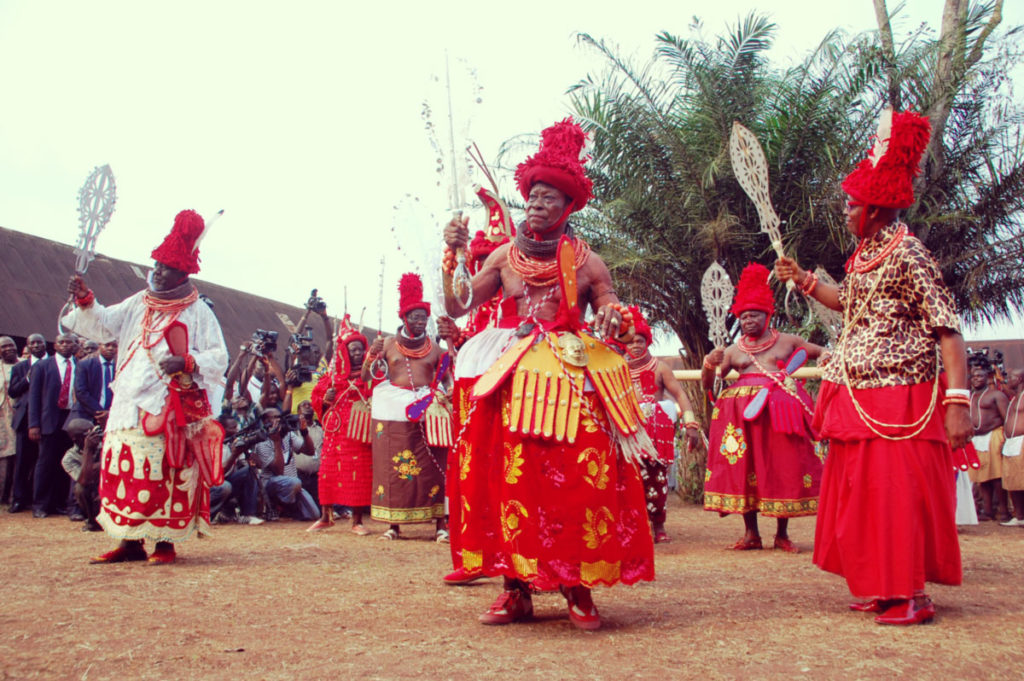
Every village across the kingdom prepared their home for the sacrifices to the gods; sons and daughters of the soil returned home to celebrate. Just as the white man toasts at midnight to the New Year, the Benins offer sacrifices to the gods of their land; a tradition we uphold each year to welcome a new season with blessings. We call it the Ijue festival: a ceremony for the monarch of the Benin kingdom to perform each year as he honours the loyalty of Ewere into the New Year.
The procession of the king
The day started with the chief priest cleansing the palace, as he welcomed the spirits of our ancestors to the throne room. Oba was not to be disturbed until the palace was ready to begin the procession through the village square. Maids prepared the palace for the arrival of guests, as the gong was struck to summon the chiefs of the land into the palace. Servings of kola-nuts were placed in wooden trays to welcome the chiefs as they took their seats as elders around the throne. The chief priest, dressed in garments of red and white, continued to strike his staff with words of incantations to the spirits.
Suddenly, a wooden staff thumped on the landing in front of the throne, as a guard cried out “Long live the king” and the chiefs prostrated in agreement saying “Isee.” The Oba walked into the room in an adornment of tribal red beads, and his golden staff—a symbol of the sovereignty of the king. The incantations of the chief priest continued: “Oba is sitting at the table of the gods. Our king is ready to transcend between the heavens and earth to make way for his people.” The king proceeded to the courtyard of the palace to begin the procession. The villagers gathered outside the walls of the palace to join their king in excitement; men left their farms, women left their pots of soups boiling on firewood outside and children abandoned their play in the sand to render praise to their king.
As the Oba proceeded, the animals held by the guards were handed to him to be slain at different points to purify the land with their blood. Women dressed in vibrant red beads danced around, as the guards surrounding the king blew the Akpata (Akpata-mamwe)—a wooden harp made of the palm trees from our ancestral shrine—in celebration of the gods. In recognition of a supreme God (Osanobua) that rules over the deities of the Benin kingdom, the monarch is obligated to visit the Arousa church for thanksgiving. He pays homage with bags of rice and goats placed on the alter of the church as the priest prays for protection for the people of Benin to end the day.
A ritual to cleanse the land
Very early the next morning, Oba is taken to the bush to cleanse the land of disloyalty (a representation of the disloyal wife of the king called Ugbi). Only the monarch is allowed to proceed into the deep ends of the forest, for the gods do not accept the presence of mere mortals. He is clothed in white garments, and covered with the lines of our ancestors across his back and face. The bush is set ablaze to send the ashes of impurity away from the land. The chief priest then begins the ceremony that gives honour to the loyal wife of Oba; a tradition of restoration once the bush is set on fire. Ewere leaves—a symbol of prosperity, joy, love and equity—are plucked and placed in a bowl and given to the Oba to share to his people.
Each household returns to perform the Igwe: a personal sacrifice of chickens, cows or goats for the first day of the year. The elder of the home prays over the blood of the dead animal and marks each person with its blood on their forehead. A plate of coconut is also handed to be eaten by the elder as prayers for protection by the gods are offered.
The final moments of celebration
The end of the Ijue festival is marked with a feast across the kingdom. Rolls of hot pounded yam and egusi is served in each home, as music is played with young girls dancing around the kingdom dressed in red. I can almost hear the sounds of pestles hitting against the tender yams in the mortars; women shouting at their sons to hurry up with the pounding as their sisters stirred the soup over firewood. Ijue was a season of love, so children ran from house to house collecting wraps of pounded yam as we celebrated.
The white man made a mockery of our beliefs in the gods of our land, but our people have held on to this faith thousands of years later. The Ijue festival is a period where loyalty counts and that is what we continue to offer up to our ancestors —loyalty to the Benin kingdom.
If you’re bored this holiday season, take some Zikoko quizzes to spice up your day.




